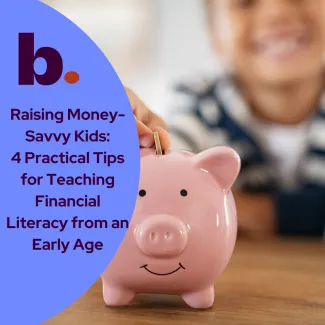
Raising Money-Savvy Kids: 4 Practical Tips for Teaching Financial Literacy from an Early Age
Helping your children learn responsible money skills from a young age is one of the most impactful things you can do as a parent, and yet often it isn’t top of mind when you’re juggling sports practices, dance recitals, work, and other responsibilities. And very few schools are actually requiring high school students to take a finance course. As of 2023, only eight states have this as a graduation requirement.(1) But ensuring your kids have a grasp on financial literacy will help benefit them through every stage of their lives.
Here are a few tips to help you lay the foundation for financial literacy for your kids.
1.Start early. Like any other healthy habit – eating well, getting enough physical activity – good money habits can be established early in life. Kids are naturally curious and watch trusted adults for cues about behavior. Going through daily life provides countless opportunities to find teachable money moments with our young ones. For example, we can explain prices at the grocery store and talk about how we can compare them. We can talk through the choices we are making and why. And we can begin to explore the concept of saving and how paying attention to what we’re spending now means we can save more later for something special.
2. Talk about it as a family. Sometimes money is a topic adults don’t talk openly about, but financial counselor Jen Hemphill says there’s a better way when it comes to our family units. She encourages families to have open financial conversations as a household and include the kids.(2) Collectively talking about financial goals as a family helps demystify money for kids and helps to get them invested in understanding and contributing to decision-making. It’s also a way for them to understand how budgeting can keep us on track and how impulse spending can set us back. The Consumer Financial Protection Bureau has a guide for families to help frame these types of conversations for kids of varied ages in ways they’ll be able to understand.(3)
3. Help them learn to earn. Earning money can help build confidence and it also gives kids the opportunity to make real choices about how to spend or save that money, based on prioritization. Because they earned it themselves, they begin to learn the value and prioritize their spending. Parents can help by working with kids on a chore list and agreeing on an allowance amount. Adults can also help kids think a little more entrepreneurially. Sure, there’s the lemonade stand that’s practically a rite of passage. But what about helping them think about what they’re good at and what they enjoy and how they could translate that into creative ways to make some extra cash. Have an especially crafty kid? They could set up a “made to order” service for friends and family. (Maybe even a virtual shop if your older kid is particularly ambitious.) Dog walking, babysitting, tutoring – helping them find a safe, age-appropriate way to earn money can empower them in the present and establish a foundation for the future.
4. Set goals. Do your kids have goals they’re working towards? Whether it’s a special toy for the younger kids or maybe saving up to help with gas money or car insurance for an older kid’s first car, there’s always a goal on the horizon. As parents, we can help our kids learn to prioritize their goals and understand what it means to work toward achieving them. We can help them do so by setting up savings accounts where they can see the fruits of their efforts accrue. As kids get a bit older, parents can set up both checking and savings accounts for children and help them begin to build their own budgets against spending and saving.
As parents, grandparents, and guardians, we can work to establish healthy financial habits early – and at any stage – for the kids we love and look after and encourage them to take those habits and learnings well into their futures.
(1) "10 smart ways to teach kids about money through the years," by Sharon Epperfson, "CNBC, Your Money," April 24, 2023
(2) "Want to teach your kids about money? Start by including them in the conversation," by Shereen Marisol Meraji and Andee Tagle, "NPR," August 3, 2021
(3) "Money as You Grow: Help for parents and caregivers," Consumer Financial Protection Bureau

